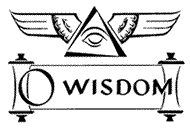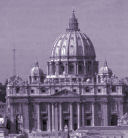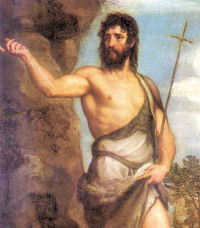Advent: December 17th
Third Sunday of Advent
Other Titles: Day 1 O Antiphons: O Sapientia (O Wisdom)
» Enjoy our Liturgical Seasons series of e-books!
"Rejoice: the Lord is nigh." As Christmas draws near, the Church emphasizes the joy which should be in our hearts over all that the birth of our Savior means for us. The great joy of Christians is to see the day drawing nigh when the Lord will come again in His glory to lead them into His kingdom. The oft-repeated Veni ("Come") of Advent is an echo not only of the prophets but also of the conclusion of the Apocalypse of St. John: "Come, Lord Jesus," the last words of the New Testament.
Today is known as Gaudete Sunday. The term Gaudete refers to the first word of the Entrance Antiphon, "Rejoice". Rose vestments are worn to emphasize our joy that Christmas is near, and we also light the rose candle on our Advent wreath.
December 17 marks the beginning of the O Antiphons, the seven jewels of our liturgy, dating back to the fourth century, one for each day until Christmas Eve. These antiphons address Christ with seven magnificent Messianic titles, based on the Old Testament prophecies and types of Christ. The Church recalls the variety of the ills of man before the coming of the Redeemer.

1st O Antiphon: Who hast issued from the mouth of the Most High, Reaching from end even unto end, Ordering all things indomitably yet tenderly, COME
|
Divine Wisdom clothes itself in the nature of a man. It conceals itself in the weakness of a child. It chooses for itself infancy, poverty, obedience, subjection, obscurity. "I will destroy the wisdom of the wise and the prudence of the prudent I will reject. . . . Hath not God made foolish the wisdom of this world? For seeing that in the wisdom of God the world by wisdom knew not God, it pleased God, by the foolishness of our preaching, to save them that believe. For both the Jews require signs, and the Greeks seek after wisdom; but we preach Christ crucified, unto the Jews, indeed, a stumbling block, and unto the Gentiles foolishness; but unto them that are called, both Jews and Greeks, Christ, the power of God and the wisdom of God. . . . But the foolish things of the world hath God chosen, that He may confound the wise; and the weak things of the world hath God chosen, that He may confound the strong. And the base things of the world and the things that are contemptible, hath God chosen, and the things that are not, that He might bring to naught the things that are" (I Cor. 1:19 ff.).
- Come, O divine Wisdom, teach us the way of knowledge. We are unwise; we judge and speak according to the vain standards of the world, which is foolishness in the eyes of God.
- Come, O divine Wisdom, give us the true knowledge and the taste for what is eternal and divine. Inspire us with a thirst for God's holy will, help us seek God's guidance and direction, enlighten us in the teachings of the holy gospel, make us submissive to Thy holy Church. Strengthen us in the forgetfulness of self, and help us to resign ourselves to a position of obscurity if that be Thy holy will. Detach our hearts from resurgent pride. Give us wisdom that we may understand that "but one thing is necessary" (Luke 10:42). "For what doth it profit a man if he gain the whole world and suffer the loss of his own soul?" (Matt. 16:26.) The Holy Spirit would have us know that one degree of grace is worth more than all worldly possessions.
|
Today is Day Two of the Christmas Novena. |
Advent Reflection: Stepping Out of the Night
What is Advent? Many answers can be given. We can grumble and say that it is nothing but a pretext for hectic activity and commercialism, prettified with sentimental clichés in which people stopped believing ages ago. In many cases this may be true, but it is not the whole picture.
We can also say that Advent is a time when a kindness that is otherwise almost entirely forgotten is mobilized; namely, the willingness to think of others and give them a token of kindness. Finally we can say that Advent is a time when old customs live again, for instance, in the singing of carols which takes place all over the country. In the melodies and the words of these carols, something of the simplicity, imagination and glad strength of the faith of our forefathers makes itself heard in our age, bringing consolation and encouraging us perhaps to have another go at that faith which could make people so glad in such hard times.
This latter kind of experience of Advent brings us quite close to what the Christian tradition has in mind with this season. It has expressed its view of Advent in the Bible texts which it took as the season's signposts. I will mention just one of them, a few verses from Paul's letter to the Christians in Rome. There he says, "... it is full time now for you to wake from sleep...the night is far gone, the day is at hand. Let us then cast off the works of darkness and put on the armor of light, let us conduct ourselves becomingly as in the day, not in revelling and drunkenness, not in debauchery and licentiousness, not in quarrelling and jealousy. But put on the Lord Jesus Christ..." (Rom 13:11-14).
There are many people, of course, who urge us to get up and awake; "Germany, awake!" was the cry of those who, years ago, were bent on deluding the nation; and today too there are awakenings and uprisings that lead further into darkness instead of out of it. What does Paul mean? He puts very clearly what he means by "night" by speaking of "revelling and drunkenness, debauchery, licentiousness, quarrelling and jealousy". For Paul, nocturnal revelling with all that goes with it stands for the dark side of human nature, man's being "asleep". For him it becomes a symbol of the pagan world as such, submerged in material things, held fast in the darkness that prevails where there is no truth and which, despite all its decibels and hectic activity, is asleep, because it lives unaware of genuine reality, of the real human vocation.
Nocturnal orgies as the image of a world in ruin—are we not appalled to see how aptly Paul characterizes our present times, which are returning to paganism? For us, "rising from sleep" means arising from conformity with the world and with the times and having the courage to believe and to shake off the dream that causes us to bypass our true vocation and our best possibilities. Perhaps the Advent hymns we hear every year may be lights to us, indicating our path, making us look up and recognize that there are greater promises than those of money, power and pleasure. Being awake for God and for other people—that is the kind of "waking" that Advent has in mind, the wakefulness which discovers the light and brightens the world.
—Joseph Cardinal Ratzinger, Seek That Which is Above

Third Sunday of Advent, Guadete Sunday
Station with San Pietro in Vaticano (St. Peter's in the Vatican):
The Station is at St. Peter's in the Vatican. After the two great basilicas chosen for the first and for the second Sunday in Advent, we come to St. Peter's in the Vatican, a church which shares with the Lateran the chief feasts of the year. It was selected as the station for today, because on this Sunday occurred the final scrutiny or examination of those candidates preparing for the Ordinations usually held on Ember Saturday in December. The original basilica was built by Constantine in 323 over the place where St. Peter was buried.
For more on San Pietro in Vaticano, see:
For further information on the Station Churches, see The Stational Church.






